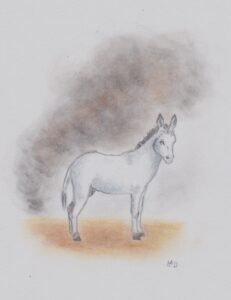For millennia, the semi-arid lands around the Mediterranean bore the imprint of donkeys’ hooves. From Gibraltar to Galilee, donkeys carried burdens, tilled the fields, and endured whatever humans imposed on them.
Donkeys appear in both the Christian and Hebrew Scriptures. The week before his death, Christ borrows a donkey and her colt for his entry into Jerusalem, and rides it to his doom. Tradition places an ass and an ox in the stable in Bethlehem, and depictions of the Flight into Egypt invariably show Mary and the Child riding a donkey that Joseph is leading out of Palestine, away from Herod’s slaughter of male babies (known in church parlance as the Massacre of the Innocents).
In the Old Testament, a donkey actually speaks. The prophet Balaam is riding his donkey on the way to a meeting which God has forbidden. On the road, an angel appears and bars their way, but only the donkey sees him. The donkey wisely stops but Balaam urges him on, then beats him until the donkey turns to him and says, “What have I done to you, that you have struck me these three times?”
If even a prophet mistreated his donkey, you can imagine how these animals were treated by less exalted owners. Donkeys were the pariahs of the equine world. Heroes rode horses into battle, and for traveling in difficult terrain the medieval aristocracy used mules, often richly caparisoned. But donkeys, with their big heads, long woolly ears, and large melancholy eyes were the all-purpose beasts of the poor. Don Quijote’s chivalric fantasy demanded that he ride a horse, the moth-eaten Rocinante, but his servant Sancho had to make do with a mere donkey that, although much loved by his master, was never given a name by Cervantes.
In the Catalan countryside of my childhood, donkeys were everywhere. My grandfather owned two, a mother and daughter (you can read about them here: https://mygreenvermont.com/of-uncles-and-equines/ ) In the long summer evenings I would watch the peasant grandmothers, dressed in black from head to foot, return to the village on the back of their little gray or brown donkeys, carrying large bundles of grass for the rabbits that every family kept in backyard hutches. Since then, however, donkeys have all but disappeared from the more affluent Mediterranean nations, having been supplanted by cars and tractors.
When the war in Israel began, I watched on the news the wanton cruelties, the bleeding children, the weeping parents, the frantic doctors, and the rage, despair, and destruction on both sides of the conflict. And suddenly amidst the urban rubble there they were, the gray, long-eared donkeys, patiently pulling carts loaded with families and luggage, their little hooves striking the asphalt of Gaza, fleeing into Egypt.
Like most everyone I know, I pray for peace these days, and for the Israelis, the Palestinians, the Ukrainians, the immigrants at the Mexico border and those crossing the Mediterranean, as well as the rest of suffering humanity. And I also add a prayer for the donkeys, the humblest of the imperiled innocents, who with their bray that is half wail and half sob are asking, like Balaam’s ass, “What have I done to you?”



15 Responses
Lali, thank you for this message. The donkey has seen much destruction throughout history and suffered long at the hands of humankind. I pray that one day all of the donkeys will be treated with the respect and kindness they deserve and also that humankind will decide that terror and war is not the way of life . I pray that one day before the earth is destroyed that peace may prevail
Amen, dear Sally.
i think you write the best prose of anyone i read all week
emily
Thank you, dear Emily, for reading and for your kind words.
i love this
emily
I have not sufficient words but you have touched my heart.
Good to hear from you, Sandy, and thank you!
I love this piece. Thank you for sharing your writing. Sorry I missed you on my last visit.
Thank you for reading, Graham. I hope to see you next time you’re here.
And they can feed themselves on many things.
What a lovely tribute to the ‘beast of burden.’
I still remember, from my childhood in Mexico City, the poem ‘Platero y yo’ about the poet Juan Ramón Jiménez’s donkey, Platero (no, I didn’t remember HIS name – looked it up – he won the Nobel prize for literature later). A lovely story – and I’ve forgotten all the details, except that this much stuck.
OMG, only you would make the connection! “Platero es pequeno, peludo, suave: tan blando por fuera que se diria todo de algodon…” I thought about rereading the book before writing the post, but I knew that it would only make me cry. Thank you for getting the text under the text.
Beautiful, the lightest feather to float through the horrendous media onslaught and touch us.
Thank you, Suzi. It’s hard to even think about what’s going on in Israel and Gaza.
Yes to all the comments– and your replies about your recent
piece on donkeys. I have not known one personally but am touched by the very sight of them bearing their impossible loads –as in Gaza most recently.. I almost got in trouble in Morocco, commenting on the horrendous load one small beast was carrying on cobblestones in the souk.
You are a compassionate soul, dear Wendy!